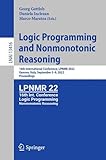Logic Programming and Nonmonotonic Reasoning [electronic resource] : 16th International Conference, LPNMR 2022, Genova, Italy, September 5–9, 2022, Proceedings /
Material type: TextSeries: Lecture Notes in Artificial Intelligence ; 13416Publisher: Cham : Springer International Publishing : Imprint: Springer, 2022Edition: 1st ed. 2022Description: XXX, 512 p. 74 illus., 36 illus. in color. online resourceContent type:
TextSeries: Lecture Notes in Artificial Intelligence ; 13416Publisher: Cham : Springer International Publishing : Imprint: Springer, 2022Edition: 1st ed. 2022Description: XXX, 512 p. 74 illus., 36 illus. in color. online resourceContent type: - text
- computer
- online resource
- 9783031157073
- Artificial intelligence
- Computer programming
- Compilers (Computer programs)
- Computer science
- Information technology -- Management
- Artificial Intelligence
- Programming Techniques
- Compilers and Interpreters
- Computer Science Logic and Foundations of Programming
- Computer Application in Administrative Data Processing
- 006.3 23
- Q334-342
- TA347.A78
Technical Contributions -- Syntactic ASP Forgetting with Forks -- Modal Logic S5 in Answer Set Programming with Lazy Creation of Worlds -- Enumeration of minimal models and MUSes in WASP -- Statistical Statements in Probabilistic Logic Programming -- A Comparative Study of Three Neural-Symbolic Approaches to Inductive Logic Programming -- A Definition of Sceptical Semantics in the Constellations Approach -- SHACL: A Description Logic in Disguise -- Tunas - Fishing for diverse Answer Sets: a Multi-Shot Trade up Strategy -- Emotional Reasoning in an Action Language for Emotion-Aware Planning -- Metric Temporal Answer Set Programming over Timed Traces -- Epistemic Logic Programs: a study of some properties -- Deep learning for the generation of heuristics in answer set programming: a case study of graph coloring -- A Qualitative Temporal Extension of Here-and-There Logic -- Representing Abstract Dialectical Frameworks with Binary Decision Diagrams -- Arguing Correctness of ASP Programs with Aggregates -- Efficient Computation of Answer Sets via SAT Modulo Acyclicity and Vertex Elimination -- IASCAR: Incremental Answer Set Counting by Anytime Refinement -- Reasoning about actions with EL ontologies and temporal answer sets for DLTL -- Inference to the Stable Explanations -- Semantics for Conditional Literals via the SM Operator -- State Transition in Multi-agent Epistemic Domains using Answer Set Programming -- Towards Provenance in Heterogeneous Knowledge Bases -- Computing Smallest MUSes of Quantified Boolean Formulas -- Pinpointing Axioms in Ontologies via ASP -- Interlinking Logic Programs and Argumentation Frameworks -- Gradient-Based Supported Model Computation in Vector Spaces -- Towards Causality-Based Conflict Resolution in Answer Set Programs -- xASP: An Explanation Generation System for Answer Set Programming -- Systems -- Solving Problems in the Polynomial Hierarchy with ASP(Q) -- A Practical Account into Counting Dung’s Extensions by Dynamic Programming -- clingraph: ASP-based Visualization -- A Machine Learning System to Improve the Performance of ASP -- QMaxSATpb: A Certified MaxSAT Solver -- Applications -- Knowledge-Based Support for Adhesive Selection -- ASP for Flexible Payroll Management -- Analysis of Cyclic Fault Propagation via ASP -- Learning to Rank the Distinctiveness of Behaviour in Serial Offending -- Optimising Business Process Discovery using Answer Set Programming -- DeduDeep: an Extensible Framework for Combining Deep Learning and ASP-based Models.
Chapters “Statistical Statements in Probabilistic Logic Programming” and “Efficient Computation of Answer Sets via SAT Modulo Acyclicity and Vertex Elimination” are available open access under a Creative Commons Attribution 4.0 International License via link.springer.com.


There are no comments on this title.